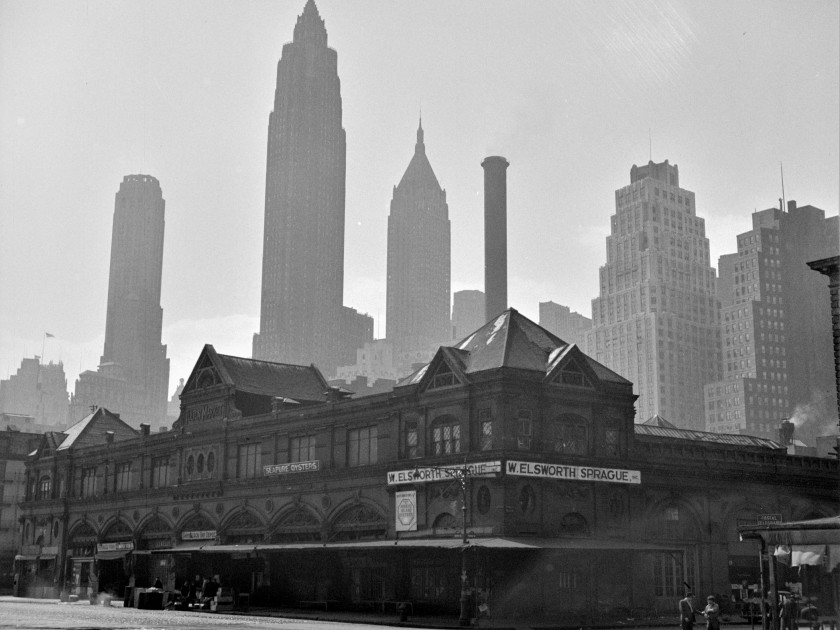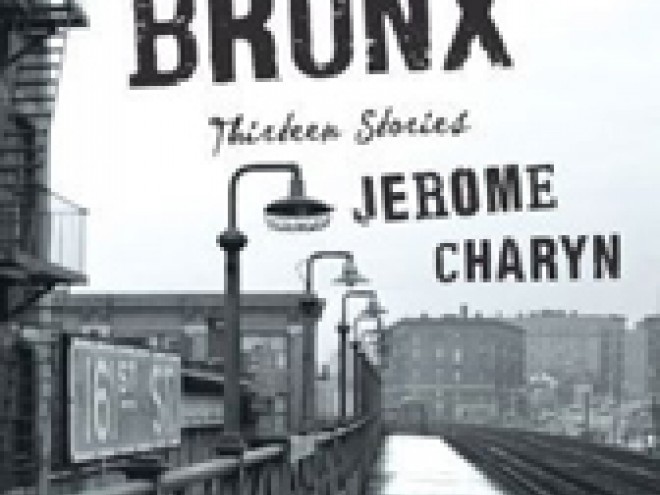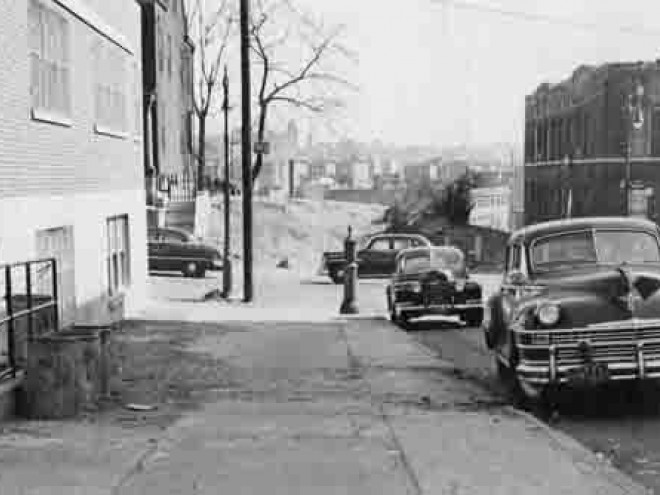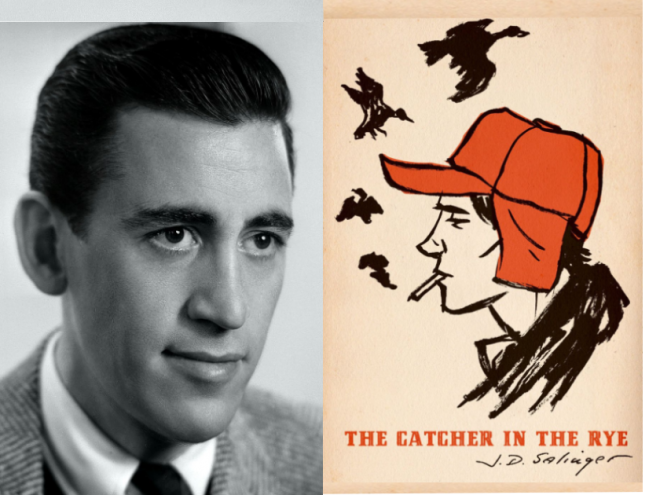
Late evening on the Lower East Side, NY, NY
Photo by Britt Fuller, 1943
I’m a child of the Lower East Side — no, golem is a better word. I was born into bitter poverty in the depths of the South Bronx. My father had a crazed stare whenever he looked at me. I was my mother’s favorite. She claimed that I never cried once after I was plucked out of her womb. My older brother, who had rickets, cried all the time. He was, she said, “a colic baby.” I was silent, observing every detail, as if I had an invisible pencil in my brain. I was constantly taking notes.
My father’s parents lived in a tenement on Henry Street, near the Forward Building on East Broadway. They’d arrived from Poland on a seaborne cattle car, and were dumped onto Ellis Island, “the Isle of Tears,” where they were pricked and prodded by so-called doctors and had to testify that they weren’t anarchists. Those deemed fit were ferried over to the “terminal” for Eastern European immigrants — Yiddish Land, the Lower East Side. The only reason I’m alive is that my grandparents showed up in Yiddish Land before the Immigration Act of 1924 limited the number of Eastern European Jews allowed into the United States. My grandfather was an illiterate apple peddler. But Tammany Hall, the Democratic Party machine, needed his vote. So it helped get him citizenship papers, even though he didn’t understand a word of English. But my father — Sam — was left behind in Poland because he had conjunctivitis and would never have gotten past the prodders at Ellis Island. He was given a violin and stayed with relatives until the conjunctivitis cleared. He was fourteen at the time, and I don’t think he ever really recovered from that initial shock of separation. The rage he must have felt was bottled up. Years later, some of it exploded onto me. I was pinched, punched, slapped, and spat upon, depending on his degree of anger.
I survived the onslaught.
Every Sunday morning, we visited my father’s parents, riding the Third Avenue El down to Chatham Square, and walking the rest of the way, no matter the season. I had little to say to my grandparents, so a few minutes after we arrived, I went out to explore the Lower East Side. I did this from the age of six or seven. That pencil in my brain was still active. I stopped at the Educational Alliance, a stone palace that gentrified German Jews had built on East Broadway to help assimilate the new arrivals from Eastern Europe and steer them away from a world of prostitution and crime. I stopped at the Forward Building, a skyscraper also on East Broadway. My father read the Forward religiously. So the building had its own magical presence in my mind.
I stopped at Orchard Street, a veritable outdoor bazaar with shirts and coats that hung from fire escapes and rattled in the wind.
I stopped at Orchard Street, a veritable outdoor bazaar with shirts and coats that hung from fire escapes and rattled in the wind. Merchants reached out at you from store fronts. They must have been desperate to try and sell a seven year old a washing machine or a camel’s hair coat. This was a street of bargains, and I was a bargainer at seven. I bought peanut brittle at half price, with the few pennies in my pocket.
I stopped at Delancey Street, saw posters of Molly Picon, the queen of Yiddish comediennes, outside a Yiddish theater. (Years later, after I wrote my first novel, Once Upon a Droshky, about a retired Yiddish actor on the Lower East Side, and sent a signed copy to Molly, she wrote back, saying how miraculous it was for a young author to write about the lost world of Yiddish theatre. To me it wasn’t miraculous at all. Molly Picon was already in my blood).
Most of all, I watched the faces as I walked. I might have stopped at the Loew’s Delancey Theater to look at posters of the Dead End Kids, or marched along Allen Street, once the Red Light District of the Lower East Side, where Jewish prostitutes promenaded beside their “cadets.” I would stare at men and women on the streets, see how ravaged they looked, worn out from all their labor. Some worked in sweatshops, others were plumbers who had little shops on Canal Street. But they walked with a staccato, dreamlike rhythm, as if they lived in a broken fantasy or fairy tale. Their sadness crept into me. And I dreamt of the Jewish prostitutes on Allen Street. It was more than a dream. They were ghosts who walked beside me. I could “taste” their rouge, summon up the rip in their long stockings.
That became the kernel of my latest novel, Ravage & Son, about a Jewish Jekyll and Hyde in 1913, who attacks prostitutes at random on Allen Street with the silver handle of his walking stick. His name is Lionel Ravage. He has a bastard son, Ben, whose existence he can hardly ignore, since the boy looks exactly like his father. Ben becomes the protégé of Abraham Cahan, the founding editor of the Forward. Cahan discovers Ben at a Jewish reform school, grooms him, and gets him into Harvard College. Ben graduates with a law degree, but instead of having a legal career, he becomes a detective for the Kehilla, a quixotic gang backed by wealthy uptown patrons to help the police root out crime on the Lower East Side. Ben is in love with Clara Karp, a tragedienne who plays Hamlet in Yiddish and English every night at a theatre near East Broadway. Lionel is also in love with Clara. Ben’s mission is to catch the Jewish Jekyll. A game of cat and mouse begins. Will Ben seize Lionel, or will Lionel murder the young detective trying to chase him down? Hence, you have Ravage & Son.
Jerome Charyn is the author of more than fifty works of fiction and nonfiction, including Ravage & Son; Sergeant Salinger; Cesare: A Novel of War-Torn Berlin; In the Shadow of King Saul: Essays on Silence and Song; Jerzy: A Novel; and A Loaded Gun: Emily Dickinson for the 21st Century. Among other honors, his work has been longlisted for the PEN Award for Biography, shortlisted for the Phi Beta Kappa Christian Gauss Award, and selected as a finalist for the Firecracker Award and PEN/Faulkner Award for Fiction. Charyn has also been named a Commander of Arts and Letters by the French Minister of Culture and received a Guggenheim Fellowship and the Rosenthal Family Foundation Award for Fiction from the American Academy of Arts and Letters. He lives in New York.


